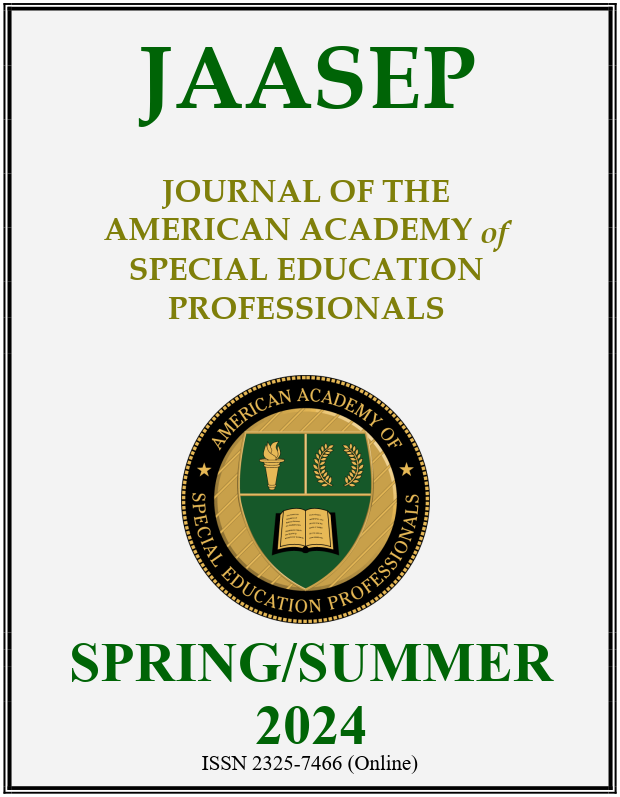Raising Expectations in Literacy for Students with Extensive Support Needs Using Multiliteracies
Ajayi, L. (2010). Preservice teachers’ knowledge, attitudes, and perception of their preparation to teach multiliteracies/multimodality. The Teacher Educator, 46(1), 6-31. https://doi.org/10.1080/08878730.2010.488279 DOI: https://doi.org/10.1080/08878730.2010.488279
Allison, E., Goldston, M.J. Modern Scientific literacy: A case study of multiliteracies and scientific practices in a fifth grade classroom. Journal of Science Education Technology 27, 270–283 (2018). https://doi.org/10.1007/s10956-017-9723-z DOI: https://doi.org/10.1007/s10956-017-9723-z
Burke, A. (2013). Creating identity: The online worlds of two English language learners. Language and Literacy, 15(3), 31–49. https://doi.org/10.20360/G2DS38 DOI: https://doi.org/10.20360/G2DS38
Cope, B., & Kalantzis, M. (2015). The things you do to know: An introduction to the pedagogy of multiliteracies. In A pedagogy of multiliteracies (pp. 1-36). Palgrave Macmillan UK. DOI: https://doi.org/10.1057/9781137539724_1
Collins, K. M. (2011). “ My mom says I'm really creative!”: Disability, positioning, and resistance in multimodal instructional contexts. Language Arts, 88(6), 409-418. https://www.jstor.org/stable/41804300 DOI: https://doi.org/10.58680/la201116262
Cooper, N., Lockyer, L., & Brown, I. (2013). Developing multiliteracies in a technology-mediated environment. Educational Media International, 50(2), 93-107. https://doi.org/10.1080/09523987.2013.795350 DOI: https://doi.org/10.1080/09523987.2013.795350
Cummins, J., & Early, M. (2010). Identity texts: The collaborative creation of power in multilingual schools. Trentham Books Ltd..
Dalton, B. (2014). Level up with multimodal composition in social studies. Reading Teacher, 68(4), 296-302. https://doi.org/10.1002/trtr.1319 DOI: https://doi.org/10.1002/trtr.1319
Forts, A. M., & Luckasson, R. (2011). Reading, writing, and friendship: Adult implications of effective literacy instruction for students with intellectual disability. Research and Practice for Persons with Severe Disabilities, 36(3-4), 121-125. https://doi.org/10.2511/027494811800824417 DOI: https://doi.org/10.2511/027494811800824417
Garcia, A. L. A., & Seglem, R. (2018). Looking at the next 20 years of multiliteracies: A discussion with Allan Luke. Theory Into Practice, 57(1), 72-78. https://doi.org/10.1080/00405841.2017.1390330 DOI: https://doi.org/10.1080/00405841.2017.1390330
Katims, D. S. (2000). Literacy instruction for people with mental retardation: Historical highlights and contemporary analysis. Education and Training in Mental Retardation and Developmental Disabilities, 35(1), 3-15.
Kenna, J. L., Russell III, W. B., & Bittman, B. (2018). How secondary social studies teachers define literacy and implement literacy teaching strategies: A qualitative research study. History Education Research Journal, 15(2), 216-232. DOI: https://doi.org/10.18546/HERJ.15.2.05
Kilinic, S., Chapman, K., Kelley, M. F., Adams, K., & Millinger, J. (2016). Teachers’ reconceptualization of young children’s identities and abilities through research-based drama professional development. International Journal of Education & the Arts, 17(22). http://www.ijea.org/v17n22/
Kliewer, C. (2008). Seeing all kids as readers: A new vision for literacy in the inclusive early childhood classroom. Paul H. Brookes Pub..
Kliewer, C., & Biklen, D. (2001). “School's not really a place for reading”: A research synthesis of the literate lives of students with severe disabilities. Journal of the Association for Persons with Severe Handicaps, 26(1), 1-12. https://doi.org/10.2511/rpsd.26.1.1 DOI: https://doi.org/10.2511/rpsd.26.1.1
Krishnan, S. (2021). The Role of multiliteracies in changing learning ppaces and promoting self-advocacy for students with complex support needs. Research and Practice for Persons with Severe Disabilities, 46(2), 108-124. https://doi.org/10.1177/15407969211010307 DOI: https://doi.org/10.1177/15407969211010307
Leander, K. M., & Lovvorn, J. F. (2006). Literacy networks: Following the circulation of texts, bodies, and objects in the schooling and online gaming of one youth. Cognition and Instruction, 24(3), 291-340. https://doi.org/10.1207/s1532690xci2403_1 DOI: https://doi.org/10.1207/s1532690xci2403_1
Llopart, M., & Esteban-Guitart, M. (2017). Strategies and resources for contextualising the curriculum based on the funds of knowledge approach: a literature review. Australian Educational Researcher 44, 255–274. https://doi.org/10.1007/s13384-017-0237-8 DOI: https://doi.org/10.1007/s13384-017-0237-8
Naraian, S., & Surabian, M. (2014). New literacy studies: An alternative frame for preparing teachers to use assistive technology. Teacher Education and Special Education, 37(4), 330–346. https://doi.org/10.1177/0888406414538843 DOI: https://doi.org/10.1177/0888406414538843
Prasad, G. (2013). Children as co-ethnographers of their plurilingual literacy practices: An exploratory case study. Language and Literacy, 15(3), 4–30. https://doi.org/10.20360/G2901N DOI: https://doi.org/10.20360/G2901N
Skerrett, A. (2013). Building multiliterate and multilingual writing practices and identities. English Education, 45(4), 322–360. https://www.jstor.org/stable/24570979 DOI: https://doi.org/10.58680/ee201323852
Steele, M. M. (2005). Teaching students with learning disabilities: Constructivism or behaviorism? Current Issues in Education, 8(10). http://cie.asu.edu/ojs/index.php/cieatasu/article/view/1607
Takeuchi, M. (2015). The situated multiliteracies approach to classroom participation: English language learners’ participation in classroom mathematics practices. Journal of Language, Identity & Education, 14(3), 159-178. https://doi.org/10.1080/15348458.2015.1041341 DOI: https://doi.org/10.1080/15348458.2015.1041341
Tan, L., & Guo, L. (2014). Multiliteracies in an outcome-driven curriculum: Where is its fit?. The Asia-Pacific Education Researcher, 23(1), 29-36. https://doi.org/10.1007/s40299-013-0082-0 DOI: https://doi.org/10.1007/s40299-013-0082-0
The New London Group. (1996). A pedagogy of multiliteracies: Designing social futures. Harvard Educational Review, 66(1), 60-93. DOI: https://doi.org/10.17763/haer.66.1.17370n67v22j160u
Zhang, Z., Nagle, J., McKishnie, B., Lin, Z., & Li, W. (2019). Scientific strengths and reported effectiveness: a systematic review of multiliteracies studies. Pedagogies: An International Journal, 14(1), 33-61. https://doi.org/10.1080/1554480X.2018.1537188 DOI: https://doi.org/10.1080/1554480X.2018.1537188
Downloads
Article Information
- Article Type Articles
- Submitted April 18, 2024
- Published June 15, 2024
- Issue Spring/Summer 2024
- Section Articles
